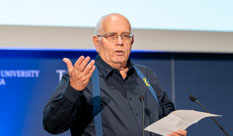More:
News & Stories
New Training Process for Faculty Coordinators
HIT participants in a unique course devised a real-life training system for Academic Coordinators at HIT– the “Water Tap” system – which deploys methods of formal and informal field research (based on the proverbial expression ‘hanging around the water cooler’).
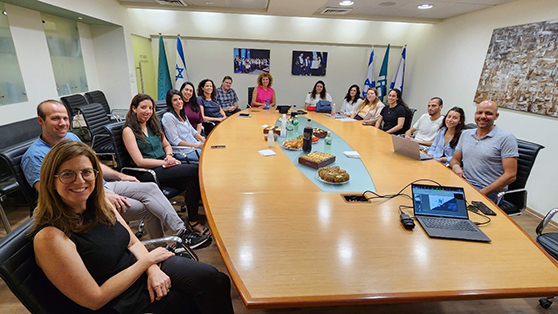
Students present the work process and the proposed solution to the customer with relevant representatives from HIT's academic management
In recent years, the academic world has been criticized for not adapting their workplace to the real world around us. In actuality, the claim that the academy focuses solely on research and basic knowledge is not accurate, because today academic courses providing practical skills and measurable results abound.
The "Special Projects" course in the Faculty of Instructional Technologies is one such example-- a practical course that requires students to resolve a real need based on an authentic challenge presented by a client organization, company or institution. The initiator of the course, Oren Ben Aharon, Administrative Head of the Faculty of Instructional Technologies and the Dean, Prof. Gila Kurtz, note that this course is an important first step towards deepening the professionalism of HIT’s academic administration, and creates a practical learning system for training employees in student services.
This year, the course was dedicated to finding solutions for its client, none other than HIT - Holon Institute of Technology! The course focused on defining the qualities and competencies required to be a well-functioning academic coordinator. It was led by Moti Elnekave, an expert in organizational learning and a lecturer in the Faculty of Instructional Technologies. "The course simulates the actions required to be taken in the field, analyzing the client and mapping needs to achieve and implement the learning solution," says Alankava.
During the course, the students worked together to create a learning system for training new academic coordinators.
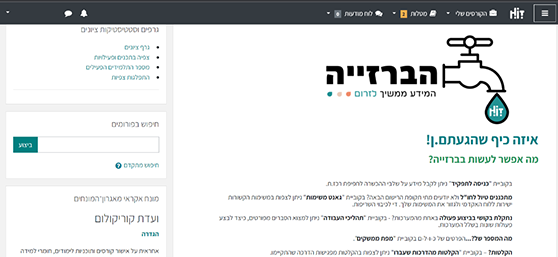
The "tap" website implemented in the corporate Moodle system
"It was a course that really simulated the experience which takes place in industry. We had a real client, (HIT) with a real challenge and a real desire to implement a solution", says Raz Mahal, a graduate of the Faculty of Instructional Technologies and one of the creators of the project. She notes that the tools she acquired in the course helped her integrate into the training development market where she works today.
The integrated system for new coordinators created by course participants’ is the result of in-depth and comprehensive research conducted by the students. "The role of the academic coordinator covers a lot of areas. Therefore, when a new coordinator arrives, there is not always the time or the possibility to give him/her the material they require to perform effectively. A lot of things fall between the cracks", says Limor Cohen, Undergraduate Coordinator in academic administration and project referent on behalf of the client (HIT).
The students in the course talked to the various academic coordinators at HIT, probing the nature of their work in an attempt to find an optimal and feasible technological solution. The culmination of the process transpired a few weeks after the end of the course, in which the solution was presented and the "water faucet " platform was exposed to the target audience –which included all the academic coordinators at the Institute.
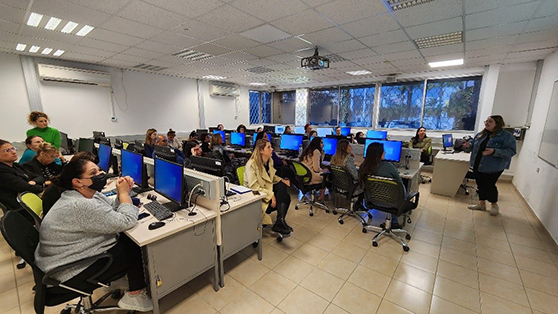
In the photo: Raz Mahal, a student in the course, presents the platform in an exposure meeting for all the coordinators
Finally, the course deliverables are now a system currently being implemented across the Institute. "This is a project that, if we had been assisted by an external company, would have cost well in excess of NIS 100,000," says Cohen.
An added benefit of the course is that the participating students acquired professional tools that will help them in future training development roles, and learned important aspects of business administration and entrepreneurship, which play a key role in an ever-changing reality such as ours.
- News & Events
New Collaboration with Sheba Medical Center will qualify nurses to work in a digital environment.
Collaboration between HIT Holon Institute of Technology, the teaching authority of the Sheba Medical Center, and the Sheba-BEYOND virtual hospital will allow training nurses in Israel and around the world to work in a digital...



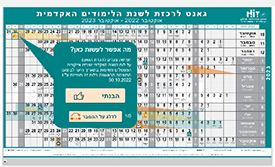
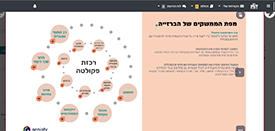
 Additional programs
Additional programs
